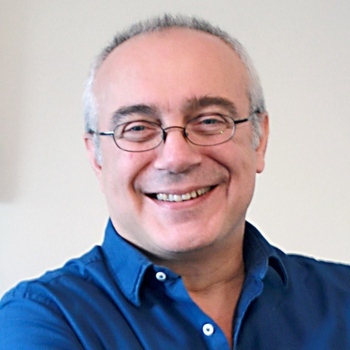
Dr. Salih M. Paker
Introduction
I am a licensed clinical psychologist (Ph.D.), also with a medical background, working as a psychotherapist since 1991. In these almost 30 years, I have mostly worked around the issues of depression, anxiety, panic, stress, phobias, dissociation; trauma, violence, abuse (psychotraumatology); personality-related difficulties; relational difficulties; difficulties around identity, meaning, and self-esteem; and personal development and maturation. I work with adults (18 and up). I have experience in individual psychotherapy, couples therapy, group therapy, short- and long-term psychotherapy, psychological counseling, clinical supervision, and psychological evaluation (especially for immigration/asylum applications). My orientation In my psychotherapy practice, I predominantly work in a relational psychodynamic framework in which I could use a general integrative model depending on the needs of my clients. Relational orientation makes the client’s current and past relational patterns (including the relationship with themselves and the therapy relationship) the main focus of therapy. My integrative approach allows me to use this relational orientation in flexible ways by integrating elements from different orientations such as humanistic, CBT, and somatic therapies depending on the context. Each therapy encounter is a unique journey. Different people could assign quite different meanings to very similar psychological problems/symptoms based on their unique histories and personalities. Thus, my relational psychodynamic approach does not simply aim to treat symptoms per se, but rather to engage the client as a whole person with all their complexities, to mutually develop a deeper understanding of not easily seen underlying dynamics which are the root causes of symptoms, and to develop new relational patterns which would promote less rigid and more creative, truthful, self-reflective, and fulfilling ways of engaging with the world. [For a more systematic list of therapeutic goals] My general approach to psychological difficulties and psychotherapy can be summarized as follows: Harmful psycho-social effects of relationships/systems that promote/allow {alienation, aloofness, disguise, disconnection, oppression, domination, obedience, inequality, injustice, violence, abuse, neglect, discrimination, extreme competitiveness, dependence, fear, anxiety, and depression} could be healed/minimized by new relationships/systems that promote {mutuality, cooperation, respect, attunement, empathy, equality, equivalence, freedom, autonomy, interdependence, creativity, playfulness, maturity, responsibility, trust, self-esteem, love, and compassion}. Psychotherapy could be such a healing relationship. A few words about my background I graduated from Istanbul University – School of Medicine in 1985 and worked as a physician for seven years while also completing my MA in clinical psychology at Bogazici University, Istanbul. I came to New York in 1992 to do my PhD in clinical psychology at the New School for Social Research. I completed my PhD and postdoc work in 2000. Until 2005, I worked as a psychotherapist and clinical director at Safe Horizon / New York, a large NGO which provides psycho-social support to trauma survivors. I relocated back to Istanbul in 2005 and founded the graduate program in clinical psychology at Istanbul Bilgi University. Until February 2019, I worked as a full-time faculty member at the Psychology Department of the same university, was the director of the graduate program in clinical psychology, taught clinical graduate courses, and provided clinical supervision. I also ran a private psychotherapy practice. I was also the founding-general-editor of the book series Psychoanalysis/Psychology, of the Istanbul Bilgi University Press. In 2019, I relocated back to New York and started my private practice. In addition to in-person therapy, I had the opportunity to gain extensive experience in working with clients from many different cultures all around the world via online therapy. My main interest areas are psychoanalysis, psychotraumatology, psychotherapy, and the intersections thereof with politics. I am especially interested in relational and integrative models of psychotherapy. I have published extensively on the psychology of torture survivors, psychotraumatology, trauma therapy, human rights, and psycho-politics. My published books include: Psiko-politik Yüzleşmeler [Psycho-political Confrontations] (2007, Birikim Press); Üniversitelerde Psikolojik Danışmanlık [Psychological Counseling at Universities] (Ed. with Filiz Yurtseven, 2015, İst. Bilgi University Press); Türkiye Debelenirken [Turkey Floundering] (2016, İst. Bilgi University Press). I conduct therapy/counseling/supervision/training in English and Turkish. For more info: www.muratpaker.com
Connect
View websiteHighlights
- Accepting new clients
- Available on nights
- Offers free consultation
- Telehealth appointments
- Accepts online payments
Licenses
-
Licensed Psychologist #015505-1 (NY)
-
Licensed Psychologist #015505-1 (NY)
Specialties
Additional focus areas
Treatment Approaches
Population focus
Appointment types
- Individuals
- Couples
- Classes
Communities
-
Lesbian, Gay, & Bisexual
-
People with Disabilities
-
Racial Justice/Equity
-
LGBTQIA+
Age groups
-
Young Adults (18-24)
-
Adults (24+)
-
Elders (65+)
Languages
-
English
-
Turkish
Faiths
-
Agnostic
-
Atheist
-
Buddhist
-
Catholic
-
Christian
-
Hindu
-
Islam
-
Jewish
Free intro call available
Pay with insurance
Looking for practitioners who accept insurance?